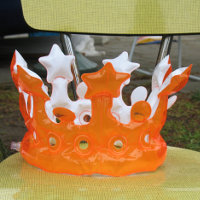 On 30 April Prince Willem-Alexander of the Netherlands will be inaugurated as king of the country.
On 30 April Prince Willem-Alexander of the Netherlands will be inaugurated as king of the country.
The government decided on three things to mark the occasion: a book of dreams, King’s Games for elementary school pupils and a King’s Song. The latter would be written by accomplished song smith John Ewbank based on verses people from all over the kingdom had sent in via Twitter and other channels.
The Moderate Voice says of the result:
The King’s Song is, in my opinion, a delightful mix of musical genres — including traditional Dutch music and (Dutch) rap — lyrics and video contributed by Dutch artists and citizens alike and put together and performed by a score of Holland’s finest artists and musicians. It displays the diversity and the beauty of today’s Dutch people, it reflects — in the lyrics — Dutch history, traditions and struggles, such as the constant fight against the sea and the vocals are soft and melodic — something that can be difficult to accomplish with the somewhat guttural Dutch language.
Problem is, the Dutch people don’t like the song! Tens of thousands of people have signed a petition that says—in jest, one presumes and hopes—that they will renounce their citizenship if the government persists in its unholy idea to have the song sung to the prince. Linguists were dragged into the spotlight to highlight the many ills of the song; then other linguists stepped up and said there is nothing wrong with the song—linguistically speaking.
Meanwhile hateful messages aimed at Ewbank kept piling up on Twitter and at some point the author of a record number of 18 Dutch number one hits decided to withdraw the song, leaving behind a flabbergasted country—how does one withdraw a song?
So what are these mistakes Ewbank supposedly made? For one thing the song is incredibly schmaltzy. In it, the prince protects citizens against the elements—“I will build a dyke with my bare hands and will keep you away from the water”—or the other way around, the whole thing is unclear. Keeping the Dutch away from water; has the narrator gone mad?
In my opinion the problem with the song is that it is just not beautiful. You could argue whether this is due to shaky grammar, ambiguous language or to trite metaphors, or even all of the above. The song feels like Ewbank phoned it in and my guess is that a broad section of the population felt the same way.
The sentence that is the banner for all who dislike the song and that has been parodied countless times the past few days is “de dag die je wist dat zou komen is eindelijk hier”. Translated literally it means “the day you knew that would come has finally arrived.” It’s not grammatically wrong, but it uses such an unusual construction that it makes the brain sit up and pay attention to the grammar of the song all of a sudden.
Saying that the people’s objections are about grammar helps to make the problem quantifiable. You can drag linguists in front of TV lights and have them say “this, then.” And if you are a talentless newspaper columnist, it helps you in blaming a nebulous ‘cultural elite’ who ‘obviously’ care more about how a song is spelled than what it tries to express.
And what if you’re the minister responsible for this mess? Jet Bussemaker, Minister for Education, unwithdrew* the song yesterday and declared it shall be sung to the new king, but with any grammatical errors removed. Later a spokesperson for the minister said she had meant it as a joke, NRC reports.
You can find the song at YouTube.
*) Yes, I have to make up words just so that I can tell you what’s going on.
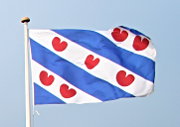 The National Frisian Party claims to have received an unfair fine of 50 euro and decided to complain about it to the local tax office in Leeuwarden, Friesland in the Frisian language.
The National Frisian Party claims to have received an unfair fine of 50 euro and decided to complain about it to the local tax office in Leeuwarden, Friesland in the Frisian language.
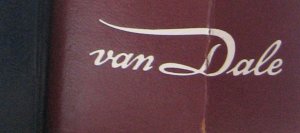

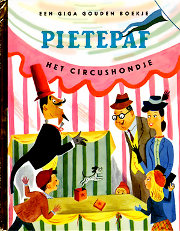 The famous Little Golden Books, a series of children’s book originally published by Simon and Schuster in the USA, have always been popular in the Netherlands.
The famous Little Golden Books, a series of children’s book originally published by Simon and Schuster in the USA, have always been popular in the Netherlands.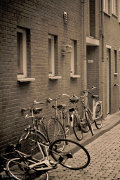 The city of Groningen elected 11-year-old Ties Leenstra as its new children’s poet laureate last Saturday,
The city of Groningen elected 11-year-old Ties Leenstra as its new children’s poet laureate last Saturday,  On 30 April Prince Willem-Alexander of the Netherlands will be inaugurated as king of the country.
On 30 April Prince Willem-Alexander of the Netherlands will be inaugurated as king of the country.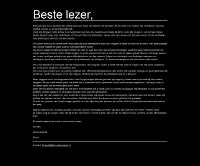 Ray Kluun has
Ray Kluun has 
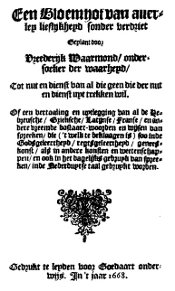 On 27 July 1668 lawyer, doctor and libertarian wunderkind Adriaan Koerbagh was convicted for heresy. His crime? Writing and publishing a dictionary* two years earlier.
On 27 July 1668 lawyer, doctor and libertarian wunderkind Adriaan Koerbagh was convicted for heresy. His crime? Writing and publishing a dictionary* two years earlier.